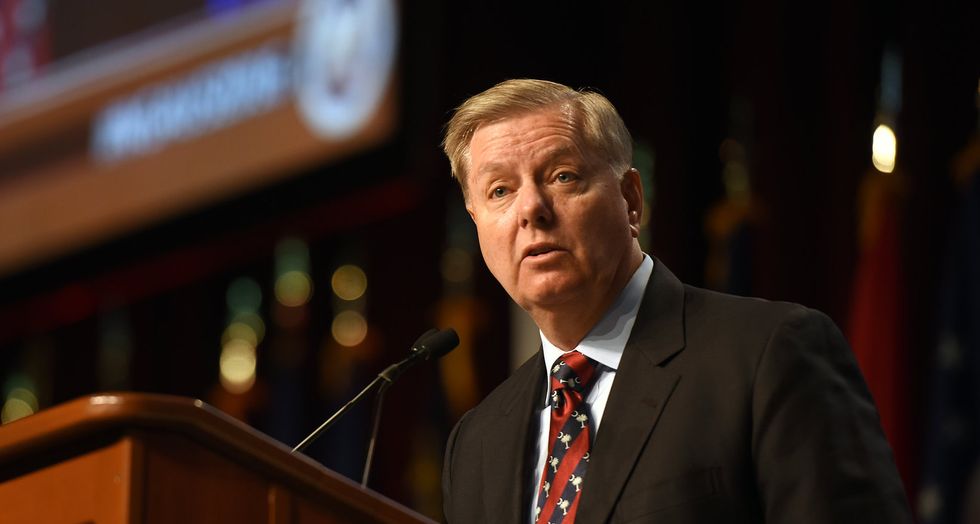Although Sen. Lindsey Graham has been vehemently critical of President Donald Trump’s decision to withdraw U.S. troops from northeastern Syria and abandon the United States’ Kurdish allies, the South Carolina Republican continues to be a staunch Trump defender on most matters — including the Ukraine scandal. And the Washington Post, in an editorial published this week, schools Graham on why Trump’s July 25 phone conversation with Ukrainian President Volodymyr Zelensky is so problematic and why Trump is now facing an impeachment inquiry in the U.S. House of Representatives.
The Post’s editorial board notes that when Trump and Zelensky spoke on July 25, Trump “pressed for investigations of former vice president Joe Biden and his son,” Hunter Biden, as well as of “the 2016 hack of the Democratic National Committee” — and did so “while dangling a White House meeting that Mr. Zelensky wanted.” As aggressively as Graham has defended Trump, he did recently say, “If you could show me that, you know, Trump was actually engaging in a quid pro quo, outside the phone call, that would be very disturbing” — and the Post’s editorial lists various reasons why there was an ongoing “quid pro quo.”
The editorial says of Graham, “Evidently, he has not followed closely the depositions and documents collected by three House committees from present and former senior administration officials. If he had, he would see they contain clear proof that Mr. Trump, acting directly and through his lawyer Rudolph W. Giuliani, repeatedly demanded a pledge from Mr. Zelensky to open those political investigations to obtain an Oval Office invitation. There is evidence that U.S. military aid was dependent on the probes as well.”
Trump, the Post adds, “requested investigations both of the DNC hack and of Mr. Biden; Mr. Zelensky promised to comply, and Mr. Trump seemed to offer a visit to Washington.”
The Post’s editorial board goes on to discuss Kurt Volker, special envoy to Ukraine for Trump’s administration.
In July, the Post points out, Volker “worked with a top aide to Mr. Zelensky, Andrey Yermak, to set up the July 25 phone call. The morning it took place, Mr. Volker texted Mr. Yermak to clearly lay out the quid pro quo: ‘Heard from White House-assuming President Z convinces Trump he will investigate/‘get to the bottom of what happened’ in 2016, we will nail down date for visit to Washington. Good luck!”
When Volker and Yermak exchanged texts in August, the editorial points out, “the trade-off of a White House meeting for a promise to investigate the Bidens and the DNC was explicit.”
In September, the Post explains, “the Ukrainians eventually told Mr. Volker that they did not want to promise investigations of Mr. Biden and the Democrats…. And Mr. Zelensky never got his White House meeting. U.S. military aid, which Mr. Trump had ordered held up on July 18, was released on September 11 — only after the corrupt quid pro quo was becoming public. By that date, House Democrats had announced that they would investigate whether the aid had been blocked to force Ukraine to assist Mr. Trump’s reelection campaign.”
The Post concludes its editorial by stressing that there is plenty of evidence of wrongdoing on Trump’s part; the question is whether or not Graham and other Trump allies have “the moral courage” to act on it.
“Mr. Graham and some other Republicans would portray the July 25 phone call as an isolated event in which Mr. Trump did not clearly conclude a quid pro quo with Mr. Zelensky,” the Post’s editorial stresses. “But the evidence presented to Congress shows that the call was part of a process that extended over three months and included repeated and specific demands for Ukraine to undertake political investigations, including of Mr. Trump’s possible 2020 opponent, lodged by Mr. Trump and by the lawyer he told top aides to work with on the deal.”


